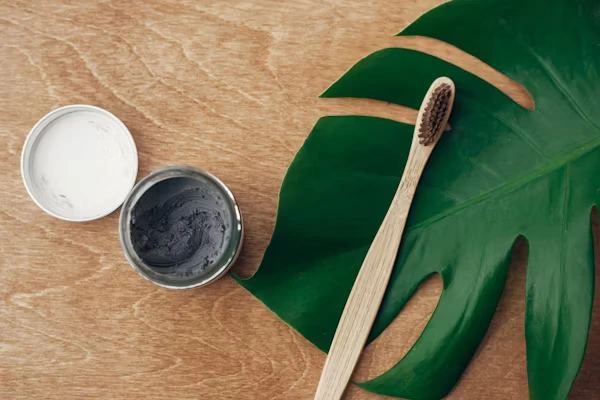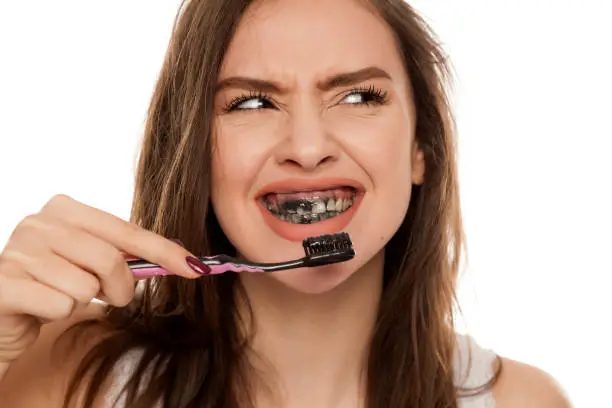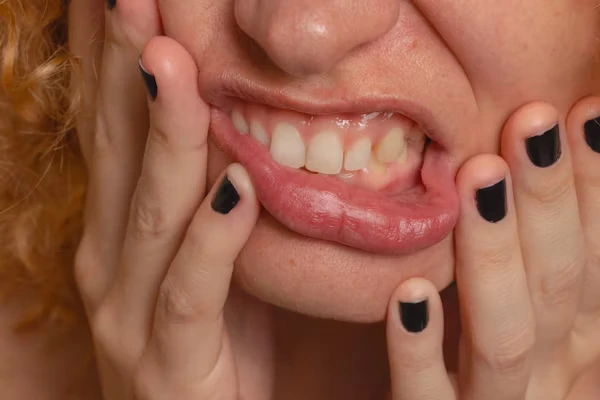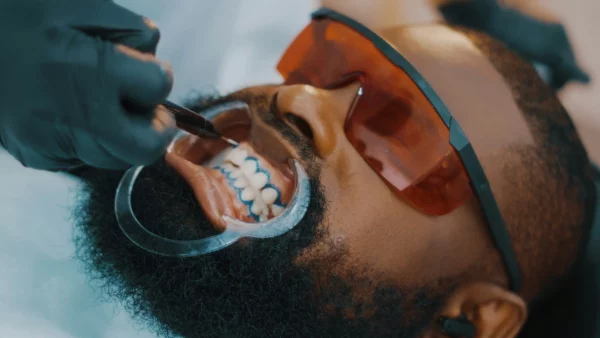Charcoal teeth whitening has exploded in popularity over the past decade, fueled by bold social media claims and the allure of “natural” dental care. From black toothpastes lining store shelves to DIY powders trending on TikTok and Instagram, many patients are curious about whether activated charcoal can truly brighten smiles. Its deep black color and dramatic “before-and-after” videos make it seem like a quick fix, but what looks convincing online is not always backed by science. While the trend seems simple and inexpensive, there are important facts about its safety, actual effectiveness, and long-term effects that every patient should understand before trying it.
What Is Charcoal Teeth Whitening?

Charcoal teeth whitening has become a widely popular trend, fueled by social media and natural health claims. It uses activated charcoal, an absorbent, porous form of carbon, to bind to surface stains on teeth, helping to remove discoloration from coffee, tea, or tobacco. Products range from loose powders to charcoal-infused toothpastes, often marketed as a quick, chemical-free way to achieve a brighter smile. While some users report noticeable short-term whitening effects, dental professionals caution that the abrasive nature of charcoal can wear down enamel over time. Additionally, there is limited scientific evidence supporting its long-term safety or effectiveness, so consistent use may do more harm than good if not done carefully.
How Activated Charcoal Claims to Remove Stains
Activated charcoal is a fine, porous black powder produced by heating carbon-rich materials like wood, coconut shells, or peat at extremely high temperatures. This process creates a surface packed with microscopic pores, giving charcoal its strong absorbent properties. In medicine, these pores help trap toxins, which is why activated charcoal is sometimes used in emergency treatments for certain ingestions. In dental products, it is marketed as a natural method to “absorb” surface stains caused by coffee, wine, tea, or other discoloring foods and drinks.
Advocates claim that brushing with charcoal pulls these stains from the enamel, leaving teeth looking brighter and cleaner. While appealing as a chemical-free alternative, dental experts caution that its abrasive texture may wear down enamel over time if used frequently or improperly.
The Rise of DIY Teeth Whitening Trends on Social Media
Social media platforms such as TikTok, Instagram, and YouTube have significantly boosted the popularity of charcoal teeth whitening. Influencers frequently share striking “before-and-after” videos that suggest immediate, dramatic results. This viral exposure has increased demand, making charcoal products readily available in toothpastes, powders, and even mouthwashes. However, these demonstrations often omit key information, including the potential risks of enamel wear, gum irritation, and long-term dental sensitivity. While visually appealing, the hype doesn’t always reflect the full picture of safety and effectiveness.
Why Patients Are Curious About Natural Alternatives
The rising demand for “clean” or “chemical-free” oral care has driven many people to explore charcoal teeth whitening as an alternative to traditional peroxide-based products. Many users are drawn to charcoal because it is marketed as “natural” and therefore safer. However, natural ingredients are not inherently risk-free, and charcoal is no exception. Unlike professionally tested teeth whitening treatments, charcoal products differ widely in composition, particle size, and abrasiveness, which makes their effects on teeth unpredictable. Some users may see temporary stain reduction, while others risk enamel erosion or gum irritation. Without standardized testing or regulation, the long-term impact of repeated charcoal use remains uncertain.
Does Charcoal Teeth Whitening Actually Work?

Charcoal teeth whitening has gained attention for its supposed ability to brighten teeth naturally, but how effective is it really? While activated charcoal can remove some surface stains from foods and beverages like coffee, tea, or red wine, it does not change the natural color of the teeth or penetrate deeper discoloration. Many users report a temporary improvement in appearance, but the results are often subtle and short-lived. Dentists caution that relying solely on charcoal for whitening may provide limited benefits while posing potential risks to enamel and gums. Understanding both its capabilities and limitations is essential before adding it to your oral care routine.
What Studies Say About Charcoal’s Effectiveness
Current research on charcoal teeth whitening remains sparse, and the evidence supporting its effectiveness is minimal. Most studies indicate that while charcoal may help reduce superficial stains, it cannot penetrate the enamel to achieve true whitening like professional treatments. Additionally, its abrasive nature may wear down enamel over time, increasing sensitivity and potentially causing long-term dental damage. The American Dental Association (ADA) has also noted that there is insufficient scientific data to confirm charcoal products are safe or effective for teeth whitening. Dentists often recommend caution and suggest evidence-based alternatives for patients seeking lasting, safe results.
Why Results May Vary from Person to Person
Results with charcoal teeth whitening are highly variable. Some patients notice minor improvements, while others see little to no change. Factors such as the type of stains, enamel thickness, and the abrasiveness of the product all influence outcomes. Surface-level discoloration, like coffee or tea stains, may lighten slightly, but deeper or intrinsic stains usually remain unaffected. This unpredictability makes it difficult to rely on charcoal as a consistent whitening solution.
Comparison with Professional Teeth Whitening Treatments
Unlike charcoal, professional teeth whitening treatments rely on clinically tested peroxide-based gels that safely penetrate the enamel to target deeper, stubborn stains. These treatments are carefully formulated to maximize whitening while minimizing enamel damage and sensitivity. Administered under the supervision of a dental professional, they allow for controlled application and monitoring of results. Patients typically see a brighter, more uniform smile in fewer sessions compared with at-home charcoal methods. Additionally, dentists can customize the treatment strength and duration to suit individual needs, ensuring both safety and effectiveness. This professional approach reduces the risk of enamel abrasion, gum irritation, and inconsistent results that often accompany DIY charcoal products.
Risks of Charcoal Teeth Whitening

While charcoal teeth whitening is often marketed as a natural and safe alternative, it carries several potential risks. Its abrasive nature can wear down enamel over time, making teeth more sensitive and vulnerable to decay. Additionally, improper use or overuse may irritate gums and cause uneven whitening. Understanding these risks is essential before incorporating charcoal into your oral care routine.
Abrasive Effects on Tooth Enamel
The primary concern with charcoal teeth whitening is its highly abrasive nature. Tooth enamel, the protective outer layer, cannot regenerate once it is worn away. Regular use of charcoal toothpaste or powders can gradually erode this enamel, leading to increased tooth sensitivity and a higher risk of cavities. Ironically, the very product intended to whiten teeth may make them appear darker over time, as the softer, yellowish dentin beneath becomes more visible. Overuse can also create uneven surfaces, making teeth more prone to staining and further damage.
Gum Irritation and Oral Health Concerns
Charcoal powders and toothpastes often contain gritty particles that can irritate delicate gum tissue. Brushing too hard with these products may lead to inflammation, bleeding, or even gum recession over time. Many charcoal formulations also lack fluoride, a key mineral that strengthens enamel and helps prevent cavities. Without fluoride protection, teeth may become more susceptible to decay and long-term damage, undermining the very goal of whitening.
Long-Term Impact of Frequent Use
Regular use of charcoal teeth whitening products without guidance from a dental professional can lead to lasting oral health issues. In addition to enamel erosion and gum irritation, the abrasive nature of charcoal can negatively affect existing dental work, including crowns, veneers, and fillings, by scratching surfaces or causing uneven wear. Charcoal particles may also settle into microscopic crevices, leading to staining or discoloration of restorations. Over time, these cumulative effects can compromise both the appearance and function of your teeth. For many patients, the potential long-term risks far outweigh the temporary cosmetic improvements that charcoal may provide.
Safer Alternatives Offered at Graham Park Dental
At Graham Park Dental, patients looking for a brighter smile have access to safe, effective alternatives to charcoal teeth whitening. These professional treatments are designed to minimize enamel damage while delivering noticeable results. By combining clinical expertise with high-quality products, the practice ensures that patients can achieve a radiant smile without compromising long-term oral health.
Professional Whitening vs. Over-the-Counter Options
Professional teeth whitening at Graham Park Dental provides both safety and effectiveness. Our dentists tailor treatments to your enamel type, sensitivity level, and desired shade, ensuring optimal results. While over-the-counter products like strips or gels can lighten teeth somewhat, they often deliver uneven results and lack the strength of professional-grade formulas. With in-office or take-home options, patients achieve a brighter, more uniform smile under expert supervision.
How We Customize Teeth Whitening Plans for Patients
At Graham Park Dental, we recognize that every smile is one-of-a-kind. Our process starts with a comprehensive evaluation of your teeth and gums to determine the safest and most effective whitening approach. We take into account existing dental work, sensitivity concerns, and lifestyle factors to customize your treatment. Often, patients benefit from a combination of in-office whitening for immediate results and take-home trays to maintain long-lasting brightness. This tailored approach ensures a radiant smile without compromising dental health.
Why Clinical Whitening Gives Longer-Lasting Results
Professional whitening treatments work beneath the enamel surface, targeting deeper stains that charcoal products cannot reach. This method provides a brighter, more uniform smile while minimizing the risk of enamel damage. When combined with proper oral hygiene, the results are long-lasting and consistent. Many patients notice a visible improvement after just one in-office session, with additional follow-up treatments helping maintain their radiant smile over time.
Frequently Asked Questions (FAQs)
1. Is charcoal safe for daily use on teeth?
No, charcoal is not recommended for daily use. Its abrasive texture can slowly wear down tooth enamel, increasing sensitivity and making teeth more prone to damage. Frequent brushing with charcoal may also irritate gums and interfere with dental restorations. Dentists generally advise using fluoride toothpaste for everyday care, as it helps strengthen enamel and prevent cavities. While occasional charcoal use may remove minor surface stains, it should never replace a regular, dentist-approved oral hygiene routine. Prioritizing safe, effective products ensures both a bright smile and long-term dental health.
2. Does charcoal whitening damage enamel?
Yes, frequent or aggressive brushing with charcoal products can harm enamel. Since enamel cannot regenerate, any wear exposes the underlying dentin, which can cause permanent sensitivity and discoloration. This irreversible damage is a key reason dental professionals strongly advise against regular charcoal use. Even occasional misuse can accelerate enamel erosion, so caution is essential when considering these products.
3. Why doesn’t my dentist recommend charcoal toothpaste?
Most dentists advise against using charcoal toothpaste due to limited scientific evidence supporting its safety and effectiveness. Additionally, many charcoal products contain little to no fluoride, which is vital for preventing cavities and strengthening enamel. For long-term oral health, dental professionals recommend treatments that are clinically proven, predictable, and safe. Using proven whitening methods reduces the risk of enamel damage, sensitivity, and other complications associated with untested products.
4. Can charcoal whitening replace professional whitening?
No, charcoal whitening cannot replace professional dental treatments. While it may temporarily lighten superficial stains, it does not penetrate enamel to remove deeper discoloration. Professional whitening offers predictable and lasting results under the supervision of a dentist. These treatments are designed to be safe for enamel and gums, minimizing the risk of damage or sensitivity. For a truly brighter and healthier smile, professional options remain the most reliable choice.
5. Are there safer natural alternatives to charcoal whitening?
Yes, there are safer natural alternatives to charcoal whitening. Baking soda-based toothpastes are gentler on enamel and often contain fluoride to protect against cavities. Oil pulling with coconut oil may help reduce surface stains, though its effects are generally mild. Herbal or plant-based whitening pastes can also offer minimal stain removal without harsh abrasives. However, for noticeable and long-lasting results, professional whitening treatments remain the most effective and reliable option.
If you’re considering charcoal teeth whitening, it’s important to understand both the potential benefits and the serious risks involved. At Graham Park Dental, we offer safe, effective whitening solutions tailored to your needs, so you don’t have to gamble with your enamel or gum health. Whether you want a quick in-office treatment or a customized take-home plan, we’ll help you achieve a brighter smile that lasts. Schedule your whitening consultation today and discover the difference of professional care for a smile you’ll truly love to show off.


